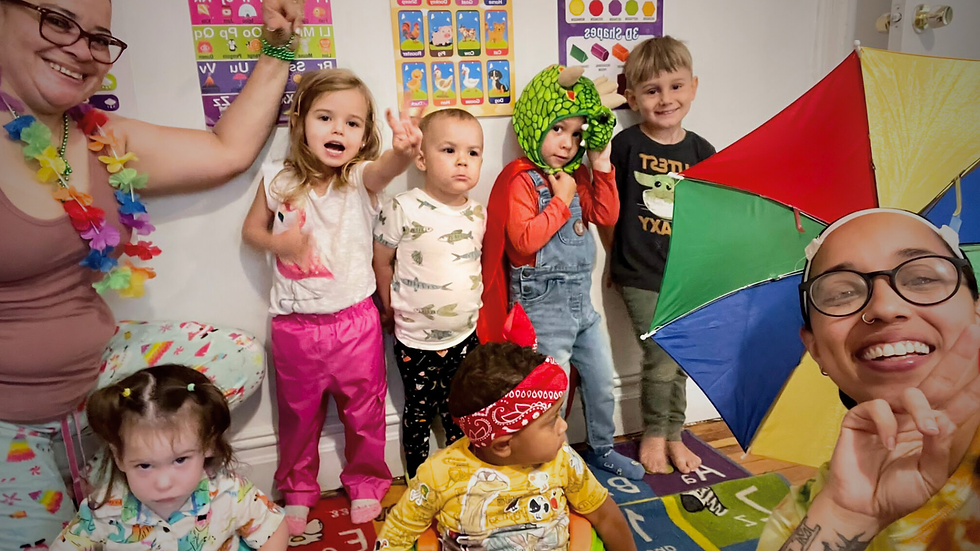Navigating the Challenges of Finding the Right Daycare
- B & J Wonderland Day Care
- Jul 6, 2025
- 3 min read
Updated: Jul 10, 2025

Finding the right daycare for your child is a significant decision that can impact their
development and your peace of mind. With so many options available, the process can
be overwhelming. From choosing the right facility to ensuring your child’s well-being,
there are many factors to consider. In this post, we’ll explore the five major criteria to look
for in a daycare, the best age for daycare, essential questions to ask when choosing a
daycare, and the #1 indicator of quality in a childcare setting.
What Are 5 Major Criteria You Would Want in a Daycare Facility?
When selecting a daycare, there are several key factors to keep in mind to ensure it meets
your child’s needs and provides a safe, nurturing environment. Here are five major criteria
to consider:
Safety and Cleanliness – The daycare facility should have a clean, well-maintained
environment that prioritizes your child’s safety. Ensure the facility is properly secured,
with safety measures in place, such as childproofed spaces, secure entryways, and
clear evacuation plans in case of emergencies.
Qualified Staff – Look for caregivers who are qualified in early childhood education
and have experience working with young children. Staff should be trained in child
development, first aid, and CPR. Additionally, low staff turnover is a positive indicator
of a stable and consistent caregiving environment.
Age-appropriate Activities – A good daycare will offer a variety of activities that
promote the social, emotional, cognitive, and physical development of children. Make
sure the daycare provides a balanced curriculum with structured play, educational
games, and outdoor activities that suit your child's age.
Positive Reviews and Reputation – Research reviews and talk to other parents to
assess the daycare’s reputation. Word of mouth can give you a clear sense of the
daycare’s strengths and any potential weaknesses.
Location and Hours – Consider the daycare’s proximity to your home or workplace, as
well as its operating hours. Make sure it fits with your schedule and provides the
flexibility you need.
For a summer program that offers a great experience for children, check out B&J
What Age Is Daycare Most Beneficial?
Daycare can be beneficial at any age, but it is especially important during the early years
of a child’s development. Research shows that children between the ages of 1 and 5
benefit the most from daycare. During these years, children are developing essential
social, emotional, and cognitive skills that will set the foundation for their future learning
and behavior.
In particular, daycare can help children between 2 and 3 years old develop their social
skills, such as sharing, communication, and empathy. They also begin to learn how to
follow routines, respect authority, and engage with other children in group settings.

What to Ask When Choosing a Daycare?
When choosing a daycare, it’s crucial to ask the right questions to ensure that the facility
meets your needs and provides a safe and nurturing environment for your child. Here are
some important questions to ask:
What is the staff-to-child ratio? – A lower ratio ensures that your child will receive
more individual attention and care.
What is the daycare’s discipline policy? – It’s important to know how the daycare
handles behavioral issues and whether their approach aligns with your values.
What is the daily schedule like? – Understanding the structure of the day will help
you ensure that your child’s needs for rest, play, and learning are being met.
How do you handle sick children? – Ask about the daycare’s policies for illness and
whether they have procedures for notifying parents if a child is unwell.
What are the staff qualifications? – Inquire about the caregivers’ education, training,
and experience with children.
What Is the #1 Indicator of Quality in a Childcare Setting?
The #1 indicator of quality in a childcare setting is the caregiver-child relationship. A
strong, nurturing bond between caregivers and children is essential for the child’s
emotional and social development. Caregivers who show genuine affection, provide
positive reinforcement, and engage actively with children create an environment where
children feel secure, loved, and supported.
Quality care goes beyond just meeting physical needs; it focuses on the emotional and
developmental needs of the child. When caregivers are attentive, responsive, and
involved, children are more likely to thrive and develop important skills that will last a
lifetime.

Conclusion
Finding the right daycare is a challenging but crucial decision for parents. By keeping
these criteria in mind and asking the right questions, you can ensure that your child
receives high-quality care in a safe and nurturing environment. Whether you are
choosing a daycare for your infant, toddler, or preschooler, the right choice will set the
foundation for your child’s growth and development, both emotionally and socially.
For a fun and enriching experience, check out B&J Daycare’s summer camp, offering a
well-rounded program for children during the summer months.






Comments